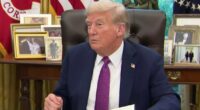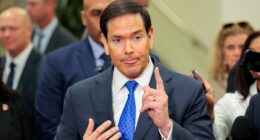Share this @internewscast.com
This year’s shock rise in Japanese shares is being called the ‘ninja stealth rally’. Since April, the Nikkei 225 and the more widely-based Topix stock market indices have climbed in a quiet manner that’s been compared to a legendary 15th-century Japanese ninja spy, remaining undetected while stalking a target.
But British investors looking to diversify are starting to notice that shares in such familiar Japanese businesses as electronics giant Sony and video games maker Nintendo have soared by as much as 40 per cent since January.
This is thanks to a trade deal with the US, but also signs of a major shift in Japanese corporate mindset. Stick-in-the-mud bosses are being compelled to embrace modernity.
Noriyuki Takizawa, Japanese technology analyst at financial services group Fidelity, says: ‘It is an often-cited paradox that as the leader in robotics, Japan is also one of the few countries that still embraces the fax machine.’
Asics, the athletics wear group, is also heading upwards. Since January there has been a 30p leap in the shares in this multinational corporation whose name is an acronym for the Latin anima sana in corpore sano (a sound mind in a sound body).
The brand owns Onitsuka Tiger, which has been one of the coolest footwear brands since its Mexico 66 yellow trainers were worn by Uma Thurman in the Quentin Tarantino film Kill Bill.

Influence: Uma Thurman wears Onitsuka Tiger Mexico 66 shoes in Kill Bill and Mount Fuji (left)
Also making strides has been Yonex, the sporting equipment maker. Its shares have jumped by 85 per cent this year, a feat attributed to an upsurge of interest in badminton.
The Nikkei, which stands at 43,018.75, could be 10 per cent higher this time next year, according to a Bloomberg survey of major fund managers. If you want to take a long-term bet on this trend, here’s what you need to know and the sectors to back.
LAND OF THE RISING INDEX
The worldwide publicity attracted by the violent ups and downs of US stock markets in recent months is the main reason why there has been little focus on the ascent of Japan.
But Wall Street angst has been Japan’s gain, with American and other international investors seeking alternative homes for their money. Since January, they have committed about $35.7billion to Japanese shares.
These purchases accelerated following Donald Trump’s Liberation Day tariff announcements in April.
Among those snapping up shares has been the Berkshire Hathaway fund led by US investor Warren Buffett.
The fund has raised its stakes in Mitsubishi and Mitsui, increasing exposure to these sogo shosha, or trading houses founded in the 18th century.
Under the trade deal struck last month, Japanese exports to the US will be subject to a 15pc tariff, less than the 25 per cent previously threatened. The 15 per cent tariff rate also applies to cars – which may also seem like a reprieve although it could still prove a challenge for Honda, Nissan and Toyota – the world’s largest car manufacturer.
The apprehension over the headwinds faced by the auto industry underline that this is a controversial agreement, with strings attached.
Japan has pledged to invest $550billion into various US industries such as artificial intelligence (AI), energy, shipbuilding and steel.
Critics say Washington will have too much influence over Japan’s external investment strategy. But they also concede that Japan had not much room for manoeuvre.
Nervousness surrounds the deal. Nevertheless, investors remain confident that the rally will continue, driven by corporate reform.
WILL IT BE DIFFERENT NOW?
The new, more positive perception of the prospects for Japan will come as a surprise to anyone who associates this nation with obdurate problems like deflation, an ageing population and a stagnant stock market. The Nikkei spent 34 years in the doldrums, only surpassing its 1989 peak of 38,916 at the beginning of 2024.
During this period, many UK investors gambled on recovery but were disappointed. But hopes are more well-founded this time around. The improvement has been spurred by factors such as GDP growth and the emergence of inflation, which is above 2 per cent – a trend that has been greeted with a hurrah.
To the British, cheering inflation may seem strange. But deflation makes us keener to save than spend, which is bad for the economy. Wages are also improving, in another sign of a move away from culturally-ingrained norms. Asking for larger salaries or boasting about your earnings was not the done thing.
Japanese companies used to be seen as bureaucratic and complacent. But this image is also fast disappearing. As Robert Burdett, of investment management company Nedgroup Investments, says: ‘Since World War Two, Japan has had 50 prime ministers compared to 15 in Britain.
‘But this rapid pace of change was not reflected in corporate policy did not alter much until Shinzo Abe came on the scene.’
Abe, who held office between 2012 and 2020, sparked the ‘Abenomics’ revolution which has shaken up businesses making them more efficient, and aware of the need to deliver shareholder value.
Bernard Chua, of American Century Investments, says: ‘Companies are setting higher profitability goals and returning capital to their shareholders.’
He adds that firms are also spending more on technology in which they have fallen behind global competitors, making Japan a ‘more investable opportunity’.
Some investors may be perturbed by Japan’s level of national debt, which is equivalent to a seemingly terrifying 256 per cent of GDP, against 96 per cent in the UK and 106 per centin the US.
But almost all of these borrowings are funded locally, meaning that the country does not rely on possibly fickle foreign creditors.
Such is the growing conviction that these bonds offer value that David Roberts, the sector guru at Nedbank, has bought them for the first time in his career. This is a significant vote of confidence.

CARS VERSUS SHOPPING
Warren Buffett was an early cheerleader for the giant Japanese trading houses Itochu, Marubeni, Mitsui, Mitsubishi and Sumitomo, taking stakes in 2020.
Buffett seems to have been drawn by the variety of these firms’ activities, ranging from chemicals and pharmaceuticals to salmon farming. Itochu owns the Family Mart chain of convenience stores, in which you can spend hours as a tourist marvelling at the different kinds of KitKat (apple, matcha and much more). Among Itochu’s other holdings is a slice of Paul Smith, the British fashion label beloved by the stylish Japanese.
When Buffett made his first foray into the sector, sogo shosha shares were seen as undervalued. They now stand at 20-year highs. Hisashi Arakawa of investment company Aberdeen points out that tariffs may have an impact on the sector’s vast export activities, which suggests the shares are a ‘hold’ until there is more clarity on this issue.
Emily Badger of the Man Group highlights the sectors that have been out of favour such as car manufacturers. She says: ‘Japanese car makers have faced challenges including competition from China, the move towards electrification and fears around a stronger yen. The possibility of high tariffs put the sector under even more strain – which means that these companies’ valuations are nearing historical lows. But we think there has been too much gloom about the prospects of companies like Honda and Nissan.’
Again, the effect of the tariffs is difficult to gauge but this could be a long-term play on Japan’s new willingness to adapt.
SPREAD YOUR RISK
There are about 4,000 Japanese listed companies – fertile ground for stock picking. But researching their credentials is tricky. A fund or investment trust gives you exposure to a spread of domestic and export businesses.
Burdett’s picks are Lazard Japan Strategic Advantage, WS Zennor Japan Equity Income and WS Morant Wright Japan, whose top holdings include Honda and Toyota. Baillie Gifford Japan and M&G Japan appear in many best-buy lists. In 2023 I put cash into Japanese funds and I am pleased with the results and persuaded that the future, although uncertain, could be bright.
DIY INVESTING PLATFORMS
AJ Bell

AJ Bell
Easy investing and ready-made portfolios
Hargreaves Lansdown

Hargreaves Lansdown
Free fund dealing and investment ideas
interactive investor

interactive investor
Flat-fee investing from £4.99 per month
InvestEngine

InvestEngine
Account and trading fee-free ETF investing
Trading 212
Trading 212
Free share dealing and no account fee
Affiliate links: If you take out a product This is Money may earn a commission. These deals are chosen by our editorial team, as we think they are worth highlighting. This does not affect our editorial independence.
Compare the best investing account for you







